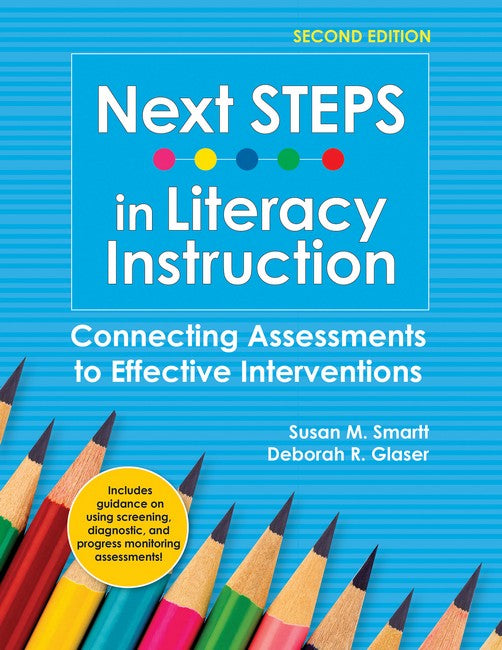Susan M. Smartt, Ph.D. As a senior research associate at Vanderbilt University, Dr. Smartt engaged in research, writing, and teaching focused on improving teacher preparation in reading. Previously, she was a national literacy consultant with state departments, teacher preparation programs, and local school districts. Her work focused on facilitating school reform, implementing, reading intervention for low-performing schools, using data to inform practice, developing Response to Intervention initiatives, and implementing scientifically based literacy programs.Dr. Smartt owned and directed a reading clinic for more than 20 years in which she provided comprehensive psychoeducational assessments, dyslexia evaluations, and tutoring services. She has been a classroom teacher, a reading coach, a reading specialist, and a principal. She was an early contributor to the development of LETRS (Language Essentials for Teachers of Reading and Spelling) (Moats & Tolman, 2017) and past president of the Tennessee branch of the International Dyslexia Association. Her publications include journal articles, edited volumes, and books on research-based reading intervention and policy initiatives, including Next STEPS in Literacy Instruction: Connecting Assessments to Effective Interventions (Smartt & Glaser, 2010). Currently, Dr. Smartt tutors and provides advocacy services for students with dyslexia. Deborah M. Glaser, Ed.D., is a national education consultant, trainer, and author based in Boisie, Idaho. Jan Hasbrouck, Ph.D., is a leading researcher, educational consultant, and author who works with schools in the U.S. and internationally. Dr. Hasbrouck worked as a reading specialist and coach for 15 years and later became a professor. Her research in reading fluency, academic assessment and interventions, and instructional coaching has been widely published. She is the author and coauthor of several books, curriculum materials, and assessment tools. She continues to collaborate with researchers on projects related to reading assessment and intervention.
Request Academic Copy
Please copy the ISBN for submitting review copy form
Description
About the Authors
About the Downloads
Preface
Acknowledgements
I Introduction
Chapter 1: Introduction To Next STEPS
Chapter 2: Using Next STEPS To Teach Struggling Readers
II Applying STEPS to the Components of Reading
Chapter 3: Phoneme Awareness
Chapter 4: Phonics—Decoding, Encoding, And Word Recognition
Chapter 5: Fluency
Chapter 6: Reading Comprehension
Chapter 7: Vocabulary
III Weaving It All Together
Chapter 8: Weaving Elements Together For A Lifetime Of Reading
Appendix A: Quick Revealing Phoneme Awareness Tool (QRPAT)
Appendix B: Acadience Reading CFOL Checklist
Glossary
References
Index
Sharon Vaughn, Executive Director, The Meadows Center for Preventing Educational Risk
Exactly what we need to put the science of reading into practice in our classrooms. Susan Smartt builds the bridge between research and practice, allowing what we know to become actionable in our classrooms.
Martha Hougen
Remarkable in its comprehensive discussion of the essential components of reading, how to measure student progress, and how to determine what to teach next. Novice teachers as well as those with vast experience will see increased student achievement when they implement the concepts presented in this text. A must for every teacher!
Amanda Nickerson, K-12 Literacy Technical Assistance Consultant
For years, Ive been wholeheartedly endorsing Next STEPS in Literacy Instruction to those committed to weaving scientific reading principles into their teaching, because it is both practical and actionable. In this revised edition…the authors draw from their extensive expertise to provide a coherent overview of the research, a deeper exploration of Multi-Tiered System of Supports (MTSS), updated assessments, and an expanded bank of instructional strategies. This book is an essential resource for educators aiming to effectively apply the science of reading!
Matthew Burns, Fein Professor of Special Education, School Psychology, and Early Childhood Studies and Assistant Director of the University of Florida Literacy Institute (UFLI) at the University of Florida
Simply put, if you can read the book, then you can implement the powerful practices described within it. [The authors] included several practical features like assessments, word lists, checklists, and templates that can immediately be put into practice and could even help improve MTSS practices. Although practicing teachers, interventionists, and school psychologists will love the book, I used the first edition to teach literacy methods to preservice professionals and look forward to putting the second edition in place.
Sarah Bondy
Truly an instructional resource for all teachers of reading that provides guidance for ‘What do I do next?’ Smartt and Glaser’s STEPS lesson process provides the application needed to target skill instruction. With clear examples and models, it would be easy for any educator to put these recommendations into action.
Stephanie A. Stollar, Founder of the Reading Science Academy
Valuable revisions includ[e] additional instructional activities to teach and practice the essential early literacy skills, expanded information on the reading brain, and connections between assessment and instruction. Positioning assessment and instruction in the MTSS framework offers teachers and school leaders a practical way to leverage the science of reading for reading improvement. In addition to supporting classroom teachers and reading specialists, educators will find Next STEPS useful for staff development and for training pre-service teachers.
Louise Spear-Swerling, Professor Emerita, Southern Connecticut State University
Very well-grounded in scientific evidence about effective reading practices, this book is loaded with practical detail about how to use assessment to plan instruction, with many specific tests, instructional activities, and lesson plans, including downloadable materials for classroom use. This text will be an invaluable resource for elementary teachers of reading.
Dee Dee Cain, Department of Elementary, Literacy & Special Education, University of Central Arkansas, Teacher Trainer
One stop shopping for the busy teacher. It has the right amount of pedagogy for understanding the science of reading and the right amount of examples to implement the components of Structured Literacy in the classroom or intervention room. The book is a must have for teachers and intervention. I wish I had this book when I began teaching in 1990. It is perfection!

